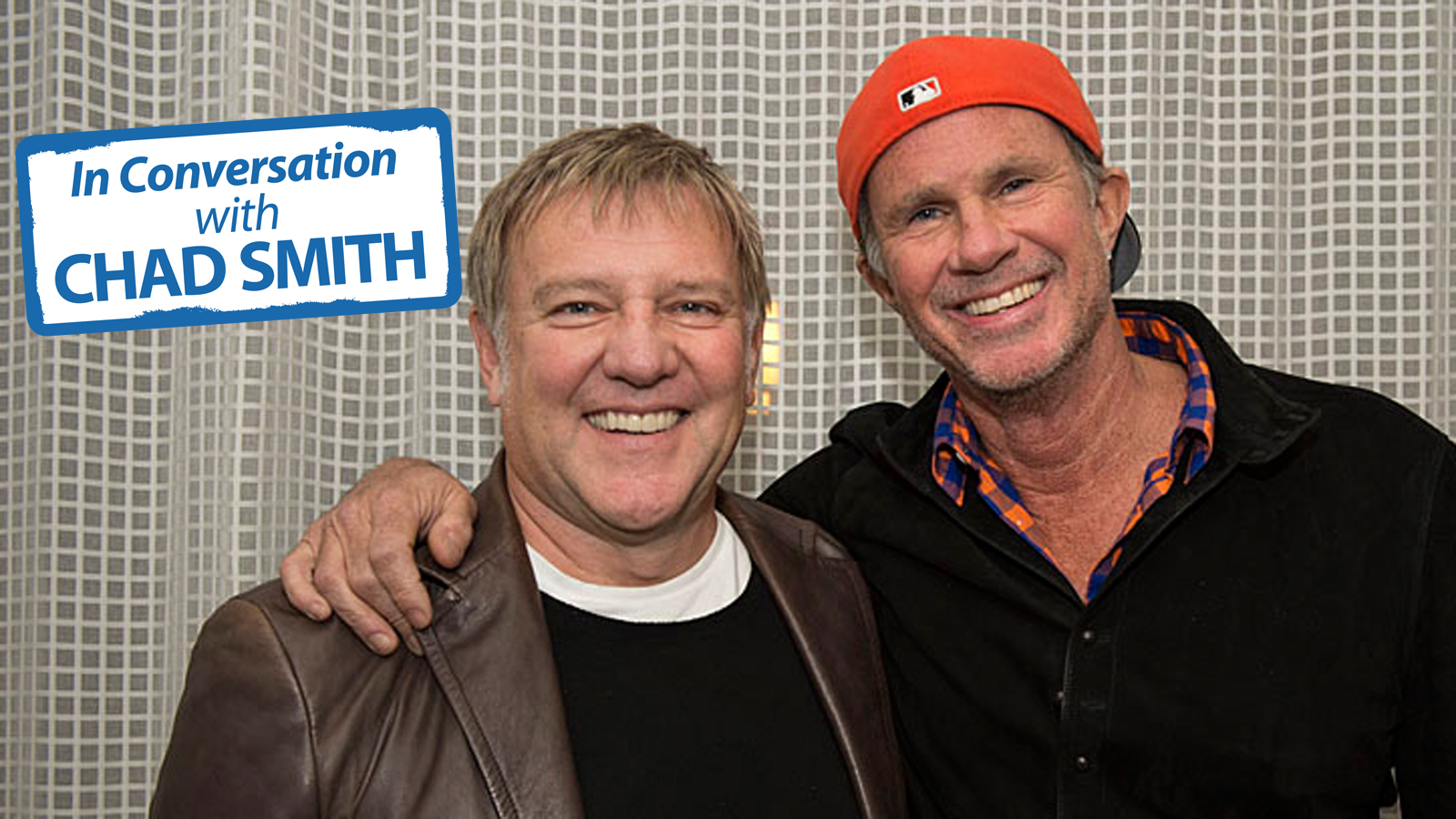
If you've been following MusicRadar's new podcast series, In Conversation, with famed Red Hot Chili Peppers drummer Chad Smith, you've been enjoying a new kind of interview - a relaxed, lively and intimate artist-to-artist chat. "The invisible interview," Smith calls it.
That's an apt description for what happened last April, when Smith welcomed his first guest to In Conversation, legendary Rush guitarist Alex Lifeson. The two sat down to dinner at the Sunset Marquis in West Hollywood, California, and over the course of two hours they talked about a host of topics both professional and highly personal, everything from Lifeson's first teenaged date with his now wife of 37 years, Charlene, to Neil Peart's efforts to put his life back together and regain his drumming prowess after enduring incredible personal tragedies.
Which is where we pick things up in Part Three, which is presented below, as Lifeson recalls Rush's first emotional show in Hartford, Connecticut, in 2002, after the band's five-year hiatus. Smith and Lifeson then segue into a spirited discussion about the mysteries of band chemistry, how technology has changed the musical landscape for both musicians and fans, and the challenges of balancing a home life with the rigors of the road. (Before listening to Part Three, you can click here for Part One and here for Part Two.)
In Conversation: Chad Smith with Alex Lifeson - Part Three begins below:
Edited transcript:
Lifeson: That first gig in Hartford, after coming back from all of that and making a record, there were moments where we all came together and played and looked at each other. I just had a lump in my throat. I could feel my eyes watering.
Smith: Oh, man…
Get the MusicRadar Newsletter
Want all the hottest music and gear news, reviews, deals, features and more, direct to your inbox? Sign up here.
Lifeson: After the show...
Smith: All the emotions, too.
Lifeson: Yeah. I'd look out in the audience, and people were crying in the audience, because they couldn't believe it was happening again. They understood the pain and everything that he'd experienced, that we'd experienced. I think in a way, it kind of makes you more human. It puts you on a more common ground with your audience.
Everybody has terrible things that they deal with. Everybody. Just because you're some big shot rock star, doesn't mean you're immune to having these awful tragedies in your life. It brings you closer. I think as a fan, it just strengthens your bond to these guys. We were all...
Smith: That's heavy, man.
Lifeson: All huggy. It was very sweet.
Smith: You guys have grown up together. It goes way beyond, "We need to play music together." Way beyond that.
Lifeson: It was interesting. I like to think that this would be the case with anybody that goes through this sort of thing, but when it happened, the band immediately became nothing. It had no importance whatsoever. It was all about helping a brother come back from the edge. I was at their house every day, after Selena had died, just helping Jackie, mostly. Other people were helping Neil. Then when he was on his quest to find solace and peace, we kept in touch. We sent e-mails, we sent faxes, whatever we could. He'd send postcards.
Smith: Yeah, the postcards. I remember reading about that in the book [laughs]. You guys would get these crazy postcards, with a couple lines on it.
Lifeson: Yeah. "I'm OK." You know what? I think that experience...
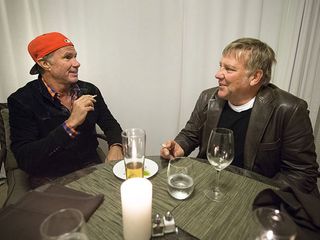
© JeromeBrunet.com
Smith: Real life stuff - it makes you go, "It's just a fucking rock band, for God's sake."
Lifeson: Exactly! Exactly.
Smith: People die in our group; people have trouble with drugs and personal stuff. Everybody goes through... If your first thought is, "Gee, when's the band gonna get back together?" You don't have a real connection. You have to have... I think, to play music that means so much to you guys, and therefore translates to mean so much to people that love it and listen to it and connect with it, they wouldn't be able to do that if you guys didn't have your own connection that you have.
People feel that. I do. I think the Eagles... "Well, we don't talk to each other, and we get up and play," and that separate dressing room shit and all that Pink Floyd kind of stuff; I don't want to get up on stage and play with people that...
Lifeson: I wouldn't do it.
Smith: I can't do it. It's not worth it. I want to connect. I want to engage and connect with the people that I'm playing with. I love these guys that I play with. We're lucky to be in a situation where we've been in a group with the same people, the ups and downs, and this and that. "I know he's weird sometimes, and I'm an idiot... "
Lifeson: But you can still love each other.
Smith: Exactly. At the end of the day, that love comes through.
Lifeson: Absolutely. You have to have that. I even saw it with Chickenfoot. I don't know how well you guys really knew each other.
Smith: But we enjoy it.
Lifeson: When I was in the dressing room with you guys, we all jammed together.
Smith: I forgot!
Lifeson: We had so much fun. Everybody was involved in it. It was a real fun thing, and connected. It shows on stage.
Smith: People pick up on that. They really do.
Lifeson: For sure they do. Especially when you come from diverse backgrounds, where everybody's a star in their own...
Smith: We got together because we were friends. Except for Joe - I didn't know Joe. I knew Mike, and I knew Sam. That started from jamming in his club down in Cabo. It wasn't like, "Let's put this guy with that guy." It was just, we were friends and we had fun playing. We kind of liked the same kind of music; we had a jumping-off point together. That was it. It was just a fun thing to do. It stayed that way, which is nice. We got Joe, and Joe's in the same way. He was just like, "I want to play in a band. This is great. I love Deep Purple and Led Zeppelin." We all grew up on that, right? Let's do our own thing. That shows.
I also think what's important... I don't know how it is with you guys, but for us, we have this... I come from a more rock background, the English... the Led Zeppelin, the Sabbaths and the Purples, like that era. I love that. I started playing when I was young, like seven. My older brother would listen to all these English blues, hard rock junk. I listened to all those records.
Flea is not - he's a trumpet player. He's jazz. His house was filled with jazz. His stepdad was a jazz musician. The trumpet was his first instrument. He started to pick up the bass, not until he was maybe out of high school - still in high school, so later, like 19 years old. Didn't know Led Zeppelin. I mean, he heard of it, but he was busy with Dizzy Gillespie and Ornette Coleman and stuff.
Anthony comes from kind of a rap... he likes everything. He's kind of all over the place. Then John, our guitar player at the time, came from a real punk rock aesthetic but also loved Frank Zappa. I think if everybody likes the same thing, though, it's going to be very one-dimensional. You have to like different things, certainly musically. I appreciate all those kinds of music, but I've got my thing, he's got his. You've got your own personality.

© JeromeBrunet.com
Lifeson: Then you put it together.
Smith: You put it together.
Lifeson: That's why you guys are completely unique, from any other band… in the history of rock music, in fact.
Smith: Well…
Lifeson: For those reasons.
Smith: I think it's a big part of it, I really do. We're honest about what we do. I'm saying this in an analogy, I think, with you guys as well. We have a similar thing - we're unique. It's hard to have really your own sound. If I hear something coming out... "That's Rush." If I hear Police, if I hear... there's certain groups. When a Red Hot Chili Peppers song comes on, you go, "OK, I know who that is." Whether it's the vocals or the singing or the sound... that's not the norm these days.
Lifeson: I agree with you.
Smith: I want to know why.
Lifeson: Yes, why is that?
Smith: How did it get so homogenized?
Lifeson: What's happened?
Smith: Where's the uniqueness?
Lifeson: Is it because recording is no longer... no thanks, I'm good. Is it because recording no longer requires a recording studio, where you're focused, and you work with an engineer, and blah, blah, blah, blah, blah?
Smith: Everybody actually plays together?
Lifeson: Now on GarageBand, you can make a good-sounding record. If you spend the money on a Pro Tools rig or Logic or something like... you know what I'm saying? Any kind of mediocre musician or band can make music now and release it and put it on iTunes. There's a glut of mediocre stuff. There's still some great music. You have to look for it. There's something, even in the sound of music now.
Smith: I think partly, without sounding like an old fart, which I am... but I don't want to sound like one... I noticed that everything's kind of made super-compressed, and make it mastered as loud as you can. It comes out of these little speakers.
Lifeson: Ear buds.
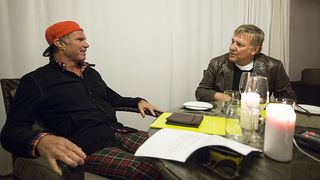
© JeromeBrunet.com
Smith: When you're talking about studio quality and stuff, that's one thing; just a general sonic sound is less pleasing. Maybe it doesn't take as much... I can't believe that people wouldn't take as much time and want that to be a big part of your creative process
I also think that another thing, too, with Pro Tools and stuff like that is that certainly in rock music... I'm talking about the rock bands that I hear. I miss the sound of a real performance. Play this song from the beginning to the end, like in the old days. "I really like the turnaround on that verse." There's good ways to do it, and there's other ways. It seems just a few times... with other people that I've worked with as well... it's really easy, because of Pro Tools, to cut and paste.
You lose the excitement of a performance that happens at the beginning, and the change in dynamics, and it speeds up and then slows down in the verse a little bit, and it's exciting. There's things I do at the end of the song that I don't do in the beginning; there's a reason why. If you cut and paste it, "I did that the first time, I did that the second time." Yeah, but it was really good and exciting. There's people that think like that now, too.
Lifeson: That's a really good… When we're recording, when we write, we do that cut and paste a lot of times. It's economical. You go back, and you get the real drums on. You play the demo from the beginning to end, and that's where the second chorus is a little different. You start injecting those nuances. You never really get away from that. You understand, that's always been the fun part of songwriting.
Smith: You're building it.
Lifeson: You know that it's going to be a subtle build, all the way through. Every part's going to be a little bit different, because you want it to be a little bit different from the other part.
Smith: Yeah - make it exciting for the listener.
Lifeson: You want it to be a true performance. That's really the excitement.
Smith: That's what affects people. That's how they get excited. I'm not exactly sure why.
Lifeson: Maybe because you've got the buds in, and you've got 2,000 songs on your iPhone, and you're walking down the street. It doesn't matter.
Smith: They're not even listening to the whole song anymore.
Lifeson: It's not the title of the song.
Smith: Number six.
Lifeson: "I love track three on your new album, and six is awesome."
Smith: "What's the one after six?" "I don't fucking know. It starts out, then it stops." I had this girl the other day, I swear to God, she came up to me... a young girl in Starbucks. "You're in the Chili Peppers? I love your band." "Oh, thank you."
Lifeson: Yeah, "I'm your biggest fan."
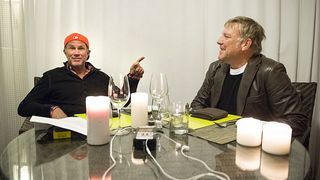
© JeromeBrunet.com
Smith: [Laughs] "Really? All right, name me a song off Blood Sugar Sex - " No, she says, "I just love that one song, number two." I swear to God. I went, "Number two on the last record, or the one before, or the song number two? We don't have any songs called number two." I said that to her, and she got kind of red. She goes, "I mean, it's number two on the CD. It's really good." She tried to sing a little bit.
Lifeson: Yes, this sounds like number two. [They laugh.]
Smith: Exactly. Al, we're just a couple old farts.
Lifeson: I know. Sitting in front of the barber shop, spitting.
Smith: "Remember the good old days, when people actually played all the way through?"
Lifeson: I know, it's so sad. Oh, well.
Smith: You know what? The good thing is, people will still come out and see people play. God bless them.
Lifeson: We get to out and play our hearts out. We get to do just what we want to do. More and more and more, people want to see that and want to experience it and be a part of it. I think that's... for us, that's a lot of the appeal. We've always cared about the live performance and always tried to be the best that we could. We didn't always succeed at it, but always tried to be the best that we could.
Even at this late stage in our lives, and I don't know how you feel about that, as you get older and more mature in your playing, there's a comfort and a confidence, and kind of a relaxed component to your performance. It's really nice to reach that. Maybe it's the additional hours above the 10,000 hours that make that difference. I feel like we're playing better than we've ever played. I don't know if that's true or not, but I feel like we are. We're more aware of it.
Smith: I don't see how that not... other than the physicality of it, and maybe... I don't know for our group, the music has changed, and the urgency of our initial, when we used to play, everything was hard and fast. That's who we were then, and that was fun. I think that there's nothing that can replace experience. The more life experiences you have, and that goes into playing your music, the person that you are, that's going to come out, if you honestly represent yourself, right?
How can that not be more enriching to being an artist? How can that not translate out into your music? "Why don't you play songs and write songs like blah, blah, blah record?" "We did those. You can go listen to them." I'm sure you get the same thing. "How come you don't do that one like that anymore?" "Because I'm not 26, or I'm not 32. This is who we are now. This is what we do now. We love it, and we're totally into it."
Lifeson: I think it's less to do with you, or you as a musician, than to that moment, when you remember when you got laid that summer.
Smith: I do that, too.
Lifeson: We all do. We all connect to some music, at some point in our lives.
Smith: That's a great thing about art and music. It's a beautiful thing. But they do - they'll get stuck. I look at the guy, and he's wearing the same clothes he probably was wearing in high school, and I look really cool. [Laughs] "But you're 37 now… "
Lifeson: Yes, you're twice as old as you were then. It's a different world.
Smith: I'm not here to judge anybody. That thing about the experiences, good and bad - everything that life throws your way comes out. I think that that's... I love going to see bands with guys who have been together. I love to go see Aerosmith. When I was a young guy, I really liked Aerosmith. Maybe not so much... they've been playing together, like you guys, for 40 years. They've got a thing. Whether you like it or not, they've got a thing. I go, and I check it out, and I'm like, "OK, whatever. They're doing their thing." I love seeing bands or musicians that have been playing together for a long time. There's something to it.
Lifeson: Yeah, an identity.
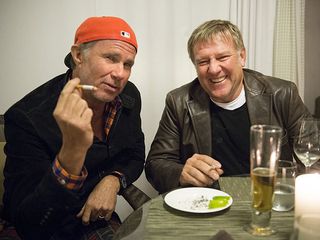
© JeromeBrunet.com
Smith: You guys, it's a perfect example of that. How is it when you play with others? Do you enjoy doing other things? You do other records and stuff, right?
Lifeson: Yeah. Mm-hmm.
Smith: I know it's completely different.
Lifeson: It's completely different. It's an exercise in… your skill as a player, and as an arranger and a songwriter. When I play on somebody else's music or record, I feel so much freer than when it's our own stuff, for some reason.
Smith: No pressure?
Lifeson: Yeah, there's no pressure, I guess. You're here interpreting someone else's interpretation, and you don't really have to... it's not your identity. It's kind of funny. You can afford to experiment and try different things. I always provide alternates to whatever I do. "Here's one idea."
Smith: "If you don't like this one… " [Laughs]
Lifeson: A few more different takes - "I like this one, too." Whatever you like and where it's going. That's a fun thing to do. I love doing that. I would play on stuff all the time if people would ask me or if the opportunity exists.
Smith: Do you think, because you're in the group, they think like, "He's… "
Lifeson: He probably won't want to do this.
Smith: "He's busy. He's doing his thing." I get that, too.
Lifeson: "No, there's no way he's going to play on our record."
Smith: [Laughs] I'll be like, "I'd love to."
Lifeson: I have to give you so much credit, because you do a lot of other things. It's not just going to a studio and playing on someone's record on a song or two. It's going on the road; that's a big commitment.
Smith: The typical thing was, that's kind of the one that, mainly because we did have down time.
Lifeson: With all of your other projects?
Smith: Exactly. That was really the only thing, why I could go.
Lifeson: You all come from such a strong background, that you know the logistics are taken care of. You've got people that know how to do the things.
Smith: Yeah, everyone's a pro and has done it lots of times. Like I said, it was a fun thing and it stayed fun. You know what? Now, how do you juggle... 'cause you've been touring forever… How do you find a balance with your family life and the touring schedule, or just working in general?
Lifeson: I think because...
Smith: It's something I need to maybe get better.
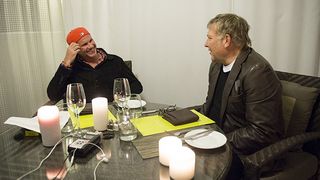
© JeromeBrunet.com
Lifeson: [Laughs] With my wife and me, this is the life that we've known forever, for the last probably… 42 years. Even though we've known each other longer, this is the life that we've known.
Smith: Since you really started.
Lifeson: We were playing clubs, bars... not even clubs, they were bars in Northern Ontario for a couple weeks here, a couple weeks there. I'd be gone for months at a time and come back. Our life is structured on me being away a lot and her looking after the fort - raising our kids, and being a chauffeur and a cook and a housekeeper and a mom and a dad, and all of those roles. It's been an unspoken thing with us. I work, I do my thing. I've been successful, so we can have a good lifestyle. We can afford to look after family members that are a little less fortunate, and have this good, balanced life.
Now that our kids are grown up and gone, it's different, the way we structure our lives together. We enjoy our time together, but we also need our time apart. We both need it. It's not like...
Smith: She's not like, "I'm lonely!"
Lifeson: It's not. She's got a very busy life.
Smith: You're used to it.
Lifeson: I'm used to it. She is, too.
Smith: You're both used to it.
Lifeson: I think that even if I work less in the future, we'll always have this, "I'm going to go away for a couple weeks." Or, "Why don't you go with the girls, and go down to Florida," or whatever it is, without any kind of weirdness or fear.
Smith: "You don't want to be around me."
Lifeson: Yeah. We're 60 - almost 60. Those days are over, of all that kind of crap. [Smith laughs] I will say, though, now that I have grandkids, I find it really difficult being away from them. Even when I'm home, I don't like to be away from them for more than four or five days. We see them every weekend. My eldest grandson is into basketball. His practices are at 7 o'clock in the morning. What we were doing was, they'd alternate weeks, where he would come and stay with us the night before and I would take him in the morning, so that their dad didn't have to take them both to school and sit with the younger one until 8:30, like for an hour and a half.
We'd get to see them alternating, once during the week, both on the weekends. We'd take them every weekend, winter, March break we'd take them to Florida. We do all these things, and we're very close to those kids. For me, I feel almost like it's a second opportunity to go through being a parent again.
Even though being a grandparent is really quite different from being a parent; it's really all about loving and nurturing, and giving them a very secure place that they can go to. It's important as a parent to provide good guidance and discipline, and all of those things, that I don't think a grandparent needs to do. It's a little too much and over the top. I like to feel like when the grandkids are with us, they're free to kick back.
Smith: Fun time.
Lifeson: Hit the couch, do whatever they want. As long as it's...
Smith: I want to be your grandson. It sounds good. I'm too old, though. [They laugh.]
Lifeson: No, you're probably not.
Smith: No, no, no, no, no. That sounds pretty good, Alex. I don't have any yet, but I'm hoping.
Lifeson: You still have...
Smith: I've got young ones.
Lifeson: They're young still.
Smith: Cole's eight, Beckett is four, and we have a seven-month-old baby. Did you know that?
Lifeson: I didn't know that. [Smith laughs] My God, that's amazing.
Smith: Dashiell.
Lifeson: You're going through... it's even more difficult. Taylor's nine, and Dylan's five. They're very close with your guys.
Smith: Very close in age, yeah - one year.
Lifeson: I don't know what it's like for you as a parent to have young kids now, this time around. Again, like playing music, you're more mature. Maybe you're not as energetic as you were when you were younger, but there's a different aspect of how you deal with kids, and how you are as a parent - much more relaxed. You don't…
Smith: Having them 15 years ago would have been like... It's a hard job, as you well know - well know. I honestly don't know how you handle that. That's difficult. Finding the right balance, for me... I feel like I'm being selfish because I want to do these music things. Should all my time away from the band, which is really my main thing, that's the thing that provides, and Nancy completely understands that. I get the feeling that, "If it's not the Chili Peppers, you need to be home with me, and raising the kids."
I understand that. It's a lot of work, especially with a new baby. Before, we would kind of divide and conquer [laughs]. Now with the third one, it's a lot. I'm trying to figure out the right balance, which is the right thing to do. The last thing I want to be is resentful towards them or towards my wife. "Oh, this guy asked me to do this thing that would be really great, but... " That kind of thing. I'll figure it out.
Lifeson: It's a tough thing to do.

“Seeking a well-mannered, affable individual. Flashy chops are wonderful, but groove and the ability to listen, react, and contribute to the musical conversation is a must”: Primus put the call out for potential new drummer

“The human manifestation of the word ‘hip’... Always in the moment, always in this time, eternal and classic and at the same time totally nonchalant about it”: Jazz legend Roy Haynes dies aged 99
Joe is a freelance journalist who has, over the past few decades, interviewed hundreds of guitarists for Guitar World, Guitar Player, MusicRadar and Classic Rock. He is also a former editor of Guitar World, contributing writer for Guitar Aficionado and VP of A&R for Island Records. He’s an enthusiastic guitarist, but he’s nowhere near the likes of the people he interviews. Surprisingly, his skills are more suited to the drums. If you need a drummer for your Beatles tribute band, look him up.

“Seeking a well-mannered, affable individual. Flashy chops are wonderful, but groove and the ability to listen, react, and contribute to the musical conversation is a must”: Primus put the call out for potential new drummer

“The human manifestation of the word ‘hip’... Always in the moment, always in this time, eternal and classic and at the same time totally nonchalant about it”: Jazz legend Roy Haynes dies aged 99
Most Popular







